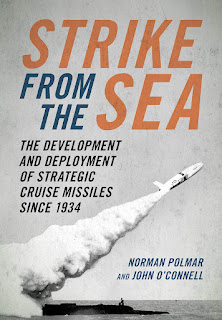This review has been submitted to the Canadian Naval Review
Title: Strike from the Sea - The Development and Deployment of Strategic Cruise Missiles Since 1934
Author: Norman Polmar and John O’Connell
ISBN: 978-1-68247-389-4
Publisher: Naval Institute Press
Year: 2020
Hardcover
Pages: 217
Photos/Tables: 77/10
In "Strike From the Sea: The Development and Deployment
of Strategic Cruise Missiles since 1934," esteemed naval historians Norman
Polmar and John O’Connell delve into the fascinating history of cruise missiles
and their significant impact on modern warfare. This comprehensive and
meticulously researched book provides a thorough examination of the
development, deployment, and strategic implications of cruise missiles over
nearly a century.
The author’s expertise shines through in their masterful
storytelling, as they take readers on a captivating journey through the
evolution of cruise missile technology. Starting from their conceptualization
in the early 1930s, Polmar and O’Connell chronicle the key milestones,
breakthroughs, and challenges that have shaped these formidable weapons. Their
attention to detail and ability to explain complex technical concepts in a
reader-friendly manner make this book accessible to both military enthusiasts
and general readers alike.
One of the book's strengths is its historical context. The authors
delve into the geopolitical climate of each era, shedding light on the
motivations behind the development and deployment of cruise missiles. They explore
how these weapons became integral components of various military strategies,
particularly during World War II, the Cold War, and beyond. Through detailed
case studies and analysis, they conclusively demonstrate the significant
influence that cruise missiles have had on shaping military doctrines and global
power dynamics.
Furthermore, Polmar and O’Connell present a balanced
perspective on the strategic implications of cruise missiles. They discuss in
detail their advantages and limitations, as well as their role in deterring
conflicts and projecting military power. The authors examine the impact of
cruise missiles on naval warfare, highlighting their ability to strike targets
from great distances with precision and their potential to reduce risks to
human life. However, they also underscore the ethical and strategic dilemmas associated
with their use, particularly in the context of civilian casualties and arms
control agreements.
The author’s writing style is engaging, and their meticulous
research is evident throughout the book. They draw from a vast array of
sources, including declassified government documents, interviews with military
personnel, and technical reports, to provide a comprehensive and authoritative
account. The inclusion of numerous photographs, diagrams, and maps further
enhances the reader's understanding and adds depth to the narrative.
If there is a minor criticism, it would be that some
sections of the book may become overly technical for readers with limited prior
knowledge of military technology. However, Polmar and O’Connell's efforts to
simplify complex concepts and provide ample explanations largely mitigate this
concern, ensuring that the book remains accessible to a wide audience.
In conclusion, "Strike From the Sea: The Development
and Deployment of Strategic Cruise Missiles since 1934" is an impressive
and invaluable contribution to the field of naval history. The author’s deep
understanding of the subject matter, coupled with an engaging writing style,
makes this book a compelling read for anyone interested in the evolution of
modern warfare. From military historians to defense analysts, this comprehensively
researched account offers an illuminating exploration of the strategic
significance and technological advancements surrounding cruise missiles
throughout history.

No comments:
Post a Comment